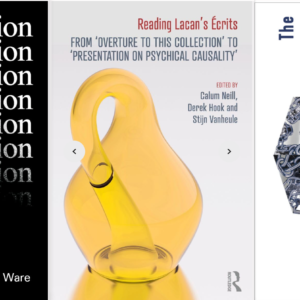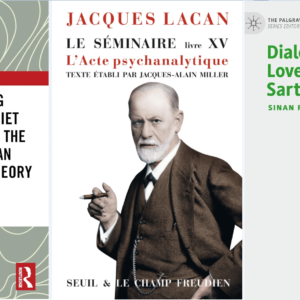News – November 2015
The attacks in Paris in November elicited commentary from many notable Lacanian voices, especially in France. Number 545 of Lacan Quotidien was the first post-attacks to address the issues from an analytic perspective and featured – among others – Eric Laurent’s article ‘Urgences subjectives de la guerre en temps de paix’ [‘Subjective emergencies of war in times of peace’]. In it Laurent compares November’s events to the January attacks on Charlie Hebdo, and discusses how commemoration can turn into a push to revive the trauma of the attacks with reference to what Lacan called the “margin of externalisation” [marge d’extériorisation] of the object a.
Meanwhile, another French analyst, Fethi Benslama, intervened in the debate in an interview with France Culture entitled ‘The Roots of Hate’. A transcript (in French) can be found via Le Monde here. Benslama’s 2009 book, Psychoanalysis and the Challenge of Islam, explores the function of the father in Islam, although from a non-Lacanian perspective. It has, however, been criticised for its alleged essentialism. One such critique of Benslama’s book, by Andrea Mura writing in the European Journal of Psychoanalysis, can be read here.
Ahead of the World Association of Psychoanalysis’ Congress in Rio next year on the theme of ‘The Speaking Body’, the WAP last month put together an online flipbook with a selection of preparatory texts comprising quotations and references from Freud, Lacan, and Jacques-Alain Miller. The document is around 70 pages in length and well-researched with care and consideration. Take a look here.
Preparatory texts for the Congress continue to be released by the WAP and its affiliates. Deserving of special mention from last month is the text of the address given by Yves Vanderveken to the London Society of the NLS on Saturday 10th October. It begins with the assertion that the nature of the unconscious is changing, echoing Lacan’s late remark that the term itself should be replaced with that of the parlêtre. Taking Hamlet, rather than Oedipus, as the model for today’s neurotic question, Vanderveken examines the solidity of the Lacanian differential diagnosis between neurosis and psychosis in terms of a binary versus continuous clinic. In so doing, he cites Lacan’s provocative quip that “nothing looks less like an obsessional neurotic (a general and universal category) than another obsessional neurotic (an absolute singularity).”
A second preparatory text on the Congress’s theme worth checking out is Miquel Bassols’ paper ‘The Body, the Visible and the Invisible’ available in English here.
Finally, as with the last WAP Congress in 2014, once again the journal Scilicet has published an edition devoted to the subject of the Congress. This issue contains over 85 short articles translated into English from the original French, Spanish, Italian and Portuguese. The full contents and a link to buy are here.
And as a reminder, 15th December is the deadline for submissions of papers for the Clinical Day of the WAP Congress to be held on 27th April. Attendees are invited to submit material on how they are confronted by the unconscious in the contemporary clinic in the context of the speaking body.
Sad news came in November about the death of Professor John Forrester, historian of psychoanalysis and translator of Lacan’s Seminars I and II. His own work was a rich, carefully-argued, and wide-ranging study of psychoanalysis. In particular, Dispatches from the Freud Wars, Truth Games: Lies, Money and Psychoanalysis, and – especially on Lacanian issues – The Seductions of Psychoanalysis. A full obituary is available on the University of Cambridge’s site, where Proffessor Forrester worked in the Department of History and Philosophy of Science. His publisher Sage has also made available his paper ‘If p, then what? Thinking in cases’ as a free download.
Among the latest publications from the last month is Bruce Fink’s Lacan on Love, an exploration of Lacan’s Seminar VIII on transference where Lacan says some of his most profound things about the nature of love in the context of a discussion of Plato’s The Symposium. Fink’s book is available now in the US and has its UK release date on Christmas Day, ahead of which it is available to pre-order.
Also published last month was The New Klein-Lacan Dialogues, which brings together a collection of papers by prominent analysts of both orientations exploring the interface between the two thinkers’ respective approaches. It follows the original volume from 1995 and includes papers around key themes across both practices, including on the ego, the object, the body, trauma, and autism.
A Special Issue of Psychoanalytical Notebooks from the London Society of the New Lacanian School was among the Lacanian journals publishing in November. It is available to buy from the Society’s site, along with previous editions. Among other texts it contains Jacques-Alain Miller’s Barcelona Seminar on the Paths of Symptom Formation from 2003, in which Miller looks closely at Lectures XVII and XXIII (on the sense of symptoms and symptom formation) from Freud’s Introductory Lectures delivered at the University of Vienna in 1915.
The New Books Network continues to offer great podcasts interviewing authors who have published recent works on psychoanalysis. In November, Darian Leader discussed his most recent book Strictly Bipolar and gave a short preview of his next work, Hands.
Among the events past and future, registration is now open for the next NLS Congress coming up in Dublin on 2nd and 3rd July on ‘Discreet Signs in Ordinary Psychosis’. Accommodation in Dublin over the weekend of the Congress is filling up fast, so those keen to go are urged to book as soon as possible.
Six monthly seminars on clinical and theoretical topics have been convened by the School of the Freudian Letter, Northwest. They run up to April 2016 and take place at Liverpool Hope University. Full details can be found on the group’s site.
Among upcoming events, the research network, Psychoanalysis in Our Time, is holding its next annual conference in Gdansk, Poland from 8-10th April 2016. The topic this time will be “Psychoanalysis and Femininity”. A call for papers has been issued, and full details of the event are available on the network’s site or on Facebook.
A call for papers was also issued for the 9th Clinical Study Days hosted in New York City by Lacanian Compass. Titled ‘Must Do It! New Forms of Demand in Subjective Experience’, contributors are invited to approach this topic via psychoanalytical notions of the drive, super-ego, jouissance and their expression in the contemporary clinic.
Two new recordings were added to Radio Lacan last month from the opening of the 2015/16 programme of the Irish Circle of the New Lacanian School’s seminar series in Dublin in September. Alan Rowan and Véronique Voruz discussed the topic ‘How does one become an analyst?’, with Rik Loose convening as Chair. Full recordings of both analysts’ talks are here.
Lastly on events, for Zizek fans, a recording of his Freud Lecture in Vienna from May is now available on Soundcloud. Much of the content will be familiar to his fans (zombies, Wagner, Hegel) but there are also less-rehearsed comments on the originality of religious experience, remarks on British psychotherapist Adam Phillips’ view of psychoanalysis, and Zizek’s interpretation of the death drive as Freud’s name for immortality (a repetition compulsion rather than biological death).
French speakers may be interested in historian of psychoanalysis – and Lacan biographer – Elisabeth Roudinesco’s latest interview which appeared in Libération last month. In it she discusses the recent changes in analytic theory and practice brought about by the need to address a burgeoning range of contemporary suffering; the serviceability of the notion of the unconscious; gay marriage; the contribution of the neurosciences; and the intervention of psychoanalysis in today’s politics.
Got news? Get in touch.




Great, thanks a lot!